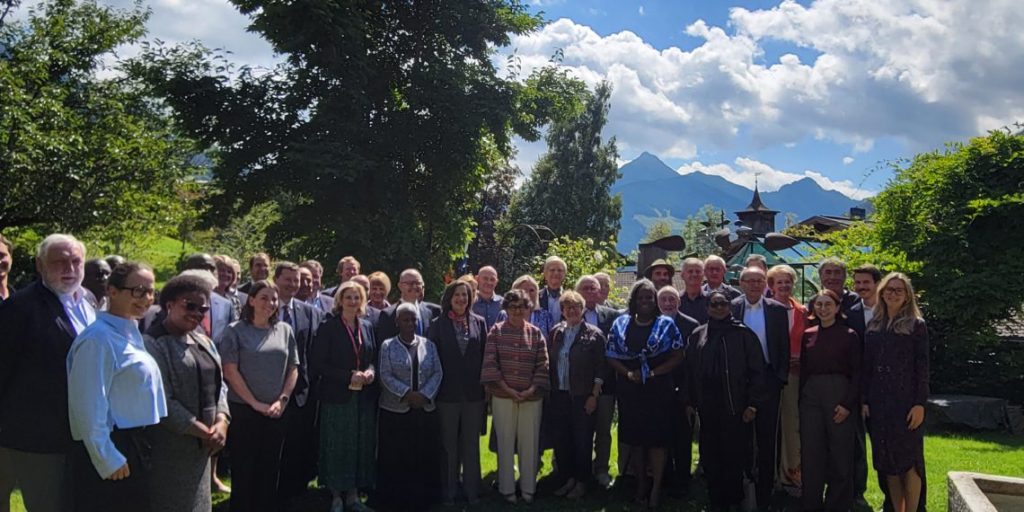St. Kitts and Nevis’s Commitment to UN Reform: A Demonstrated Multilateral Partnership
The United Nations, facing its 80th anniversary, finds itself at a critical juncture, prompting a necessary reflection on its past, present, and future. Against this backdrop, the Austrian Federal Ministry of European and International Affairs hosted an exclusive retreat titled “UN Reform: Walking the Talk” at the European Forum Alpbach 2025. This invitation-only event, held from August 23rd to 25th, served as a platform for high-level discussions and strategic thinking on revitalizing the UN, particularly in the realm of peace and security. The retreat aimed to stimulate innovative ideas and challenge existing assumptions, encouraging participants to contribute boldly to the conversation on the future of the multilateral organization.
St. Kitts and Nevis, represented by its Permanent Representative to the UN, H.E. Dr. Mutryce Williams, actively participated in this significant gathering. Ambassador Williams, while acknowledging the honor of representing a small island developing state in such a crucial dialogue, highlighted the importance of inclusive multilateralism anchored in international law. Echoing the sentiments of Austrian ambassador Hannah Liko, she emphasized the need to assess both the accomplishments and shortcomings of the UN over the past eight decades, ultimately asking the critical question: “What kind of organization do we need for the world tomorrow?” This question underscored the urgency and importance of the retreat’s deliberations.
Beyond the traditional focus on diplomacy and security, Ambassador Williams brought a unique perspective to the discussion, emphasizing the often-overlooked role of youth and artists in shaping the future of the UN. She argued that engaging these groups is crucial for maintaining the organization’s relevance for generations to come. Drawing inspiration from the Trinidadian calypsonian Singing Sandra and her powerful anti-war anthem “Nobody Wins a War,” Ambassador Williams highlighted the potential of art to inspire action and influence political discourse. She even extended this call to action to renowned Austrian singer-songwriter Hubert von Goisern, present at the forum, urging him to utilize his artistic platform to promote peace and global understanding.
The Alpbach 2025 retreat, coming a year after the adoption of the Pact for the Future – which mandated a comprehensive review of peace operations and called for stronger partnerships with regional organizations – provided a timely opportunity to assess progress and chart a course for the future. The discussions focused on strengthening peace operations in a rapidly changing global landscape, acknowledging the increasing complexity of contemporary conflicts and the need for adaptable and effective responses. The retreat served as a crucial platform for reflection, forward-looking dialogue, and the formulation of actionable recommendations to enhance the UN’s capacity to maintain peace and security.
The backdrop against which this retreat took place is one of increasing geopolitical fragmentation and escalating threats to international peace and security. The Austrian Federal Ministry, recognizing the UN’s indispensable role as a guardian of the international order, acknowledged the unprecedented pressures the organization faces. In this context, the retreat aimed to generate innovative solutions and strengthen the UN’s ability to address complex crises effectively. The emphasis was on bold thinking, renewed commitment, and innovation within the organization to navigate the challenging global environment.
Bringing together a diverse group of stakeholders, including senior UN officials, diplomats, and leading experts, the retreat facilitated a multi-faceted approach to addressing the challenges facing the UN. The discussions focused specifically on enhancing collaboration between the UN and regional actors, re-evaluating the role of peacekeeping in contemporary conflicts, and identifying the evolving leadership needs of the organization. This comprehensive approach aimed to equip the UN with the necessary tools and strategies to effectively fulfill its mandate in a rapidly changing world. The retreat served as a powerful testament to the importance of continued dialogue, critical reflection, and collaborative action in strengthening multilateralism and ensuring the UN’s enduring relevance in promoting global peace and security.
Share this content:












Post Comment